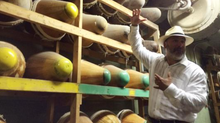Dirtiest Man On TV Mike Rowe Takes On America's Skills Gap Problem

As unemployment hovers near historic lows, over 80% of construction firms have reported they are having a hard time finding qualified workers to hire, while the U.S. Department of Education reports that there will be 68% more job openings in infrastructure-related fields in the next five years than there are people training to fill them.
In honor of our nation’s upcoming Labor Day, I was excited to catch up with Mike Rowe, dubbed the “Dirtiest Man on TV.” Mike is the creator, executive producer and host of TV’s Dirty Jobs and Somebody’s Gotta Do it and executive producer and host of Facebook’s Returning the Favor. He’s also the founder and CEO of the mikeroweWORKS Foundation, which awards scholarships based on work ethic to students pursuing a career in the skilled trades. He delivers a podcast called The Way I Heard It, which is a five-minute mystery designed for people with a curious mind and a short attention span.
I connected with Rowe this week to talk about his take on why the U.S. has so many job openings in fields such as construction and manufacturing that are not filled, why that’s damaging to our country, and what we can do about it.
Kathy Caprino: Mike, why does the U.S. continue to have so many job openings in fields such as construction and manufacturing, and not enough people to fill them?
Mike Rowe: In a very general way, our society has fallen out of love with the skilled trades. Part of the problem is a myriad of myths and misperceptions that surround the jobs themselves, but the biggest cause is our stubborn belief that a four-year degree is the best path for the most people. This cookie-cutter approach to education has pushed an entire generation away from millions of good jobs, while driving the cost of college through the roof. The result is a skills gap that gets wider every year, and a student loan crisis unlike anything we’ve ever seen.
Caprino: Where do you think the belief came from that a four-year degree is automatically the best path for most people?
Rowe: I think it started with the realization that America would benefit if more people went to college. Once upon a time, this was a perfectly sensible belief. So college got a much needed PR campaign. But over time, the push for “higher education” began to come at the expense of all other forms of education. Guidance counselors (my own included) warned us that anything less than a college degree would lead to something dark and dirty. Something menial. Soon, shop class was gone from high school, the cost of college began to rise, and billions of dollars in student loans were made available to kids too young to vote. Today, “the best path for the most people” is the most expensive path for the whole nation, and now, we’re looking at $1.5 trillion dollars of student debt. Worse, most people who start college don’t even finish. In short, we’re lending money we don’t have to kids who can’t pay it back, educating them for jobs they can no longer find, while discouraging them from pursuing good jobs that actually exist.
Caprino: What are the biggest myths you hear about working in the trades?
Rowe: So many, but the biggest misperception is lousy pay. My foundation has helped train hundreds of welders and diesel mechanics, many of whom make upwards of $75,000 a year. Some make north of six figures, and many go on to run their own businesses. But we rarely hear those stories in the press. Instead, we get studies that try to justify the cost of college. I read one last month that compared the income of college graduates with the income of non-college graduates. Naturally, the study concluded that college graduates made more. But the study didn’t compare skilled tradespeople to college graduates – it compared everyone to college graduates – including those with no skill. In other words, they put high school dropouts and unskilled workers into the same category as skilled tradespeople.
If you dig a little deeper, and compare the income of a philosophy major, (or a history major, or a sociology major, or a math major) to that of a welder, or a plumber, or an electrician, you’ll see that the trades pay a very competitive wage – without the soul-crushing debt of a four-year degree.
Caprino: Why is work ethic so important to you, and who did you learn your work ethic from?
Rowe: Work ethic is important because, unlike intelligence, athleticism, charisma, or any other natural attribute, it’s a choice. The real secret to work ethic, which I learned from my parents, is not persistence or determination or the ability to “suck it up” – it’s to actually figure out a way to enjoy the task at hand. That’s why it was so important on Dirty Jobs to capture the humor that’s present on most job sites. The people I know with the best work ethic are inherently cheerful - people who have made a conscious decision to love whatever it is they happen to be doing. It really goes to the notion of “job satisfaction.” People with a lousy work ethic, by and large, expect their job to satisfy them. People with a solid work ethic, will find satisfaction in whatever they do. Ultimately, work ethic is attitude.
Caprino: Labor Day — our nation’s holiday to celebrate American workers — is coming up. What does it mean to you?
Rowe: I launched the mikeroweWORKS Foundation on Labor Day of 2008. This year, we’re celebrating our 10-year anniversary with another allotment of Work Ethic Scholarships, made possible by the generosity of many companies and individuals who support our mission.
So far, we’ve raised over five million dollars, and helped train nearly a thousand people for good jobs that actually exist. This year, I also got a very cool birthday present from Wolverine – they’re releasing a limited version of a mikeroweWORKS boot, and donating 100% of the proceeds to the mikeroweWORKS Foundation. I’m excited about this because the boots are terrific, made in the USA, and they’re a great way to support the next generation of skilled workers.
Caprino: What do companies need to do to close the skills gap? What about parents and counselors?
Rowe: Companies that rely upon a skilled workforce need to do a better job of telling the success stories under their own roof . It starts there. I’d like to see those stories unfold in the national media, and I’d be happy to help tell them. Fundamentally, that’s what the mikeroweWORKS Foundation does. As for parents, I wouldn’t presume to tell anyone how to raise their kid. But I would say that it’s a mistake to put your thumb on the scale. The best thing we can do for kids who are trying to figure out what they want to do, is to keep them out of debt, and show them every available opportunity - including those that reward the mastery of a useful skill.





















